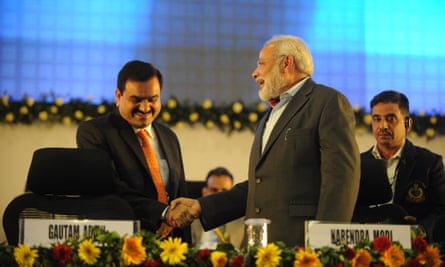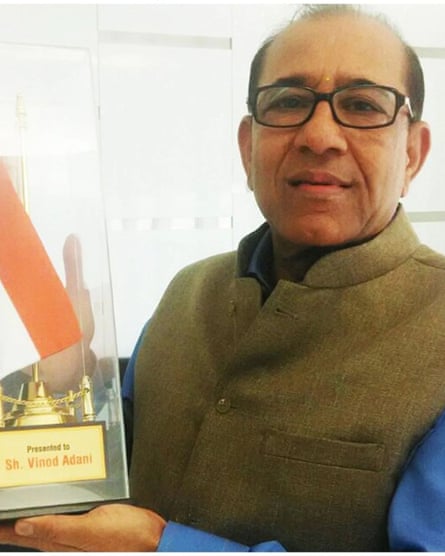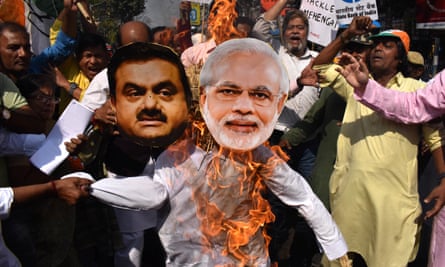'People will forgive you for being wrong, but they will never forgive you for being right - especially if events prove you right while proving them wrong.' Thomas Sowell
Search This Blog
Wednesday, 14 August 2024
Tuesday, 30 July 2024
Stand up Routine
Introduction:
S: Daddy, why don’t we make short satirical films on issues that need some clarity?
D: Why, what’s the purpose?
S: This will give us a chance to explore what we think, what we see and what it means?
D: I don’t know, son.
1.
Son: Daddy, Om Birla says that the names of Adani and Ambani cannot be raised in the Lok Sabha.
Daddy: Yes, I heard it too. He says, it's because Adani and Ambani are not in a position to respond to the allegations.
S: But the BJP always raises Nehru and Gandhi? Can they respond to the claims?
D: They believe the soul of Nehru and the Gandhis pervades parliament and hence can be invoked?
S: Does that mean that Ambani and Adani are soulless, Daddy?
D: I don't know son.
2.
Modiji phones Nirmala Sitharaman, 'Nirmalaji, yeh madhyam varg kyon ro rahen hai?
Nirmala: Sir, in Mussalmano ko rone do, Kuch dere ke baad chup ho jayenge'.
Modi: 'Kya matlab? Inme to koi Mussalman nahi hai'
Nirmala: Sir, yeh log hamare Mussaalman hai. Mera matlab hum shasan mein kuch bhi kar sakte hain aur chunav ke time par agar ham bole ki Hindu khatren mein hai to yeh kamal par angootha laga hi denge.
Modi: Ha, ha, main bhool gaya tha! Lage raho Nirmalaji.
3.
S: Daddy, a 40 year old American woman was found chained to a tree in the Sindhudurg forests for 40 days.
D: Yes, I heard that Lalita Kayi had come to India to learn yoga and meditation.
S: Doesn’t this chaining require her to intensely meditate about her condition for 40 days, Daddy?
D: I don’t know son!
4.
S: Daddy, you remember the fairy tale 'The Emperor's New Clothes'? hat eventually happened to the truthful child?
D: Why do you ask? I think the child was subjected to severe punishment. Immediately after the parade he was pulled up by the Enforcement Directorate for being anti-national.
S: Did the people honour the child after the emperor was deposed?
D: Honoured? After the emperor was deposed the public pilloried him for destroying their dream.
S: Does that explain your experience with your bhakt friends and relatives?
D: I don’t know son!
5.
S: Daddy, are Indian industrialists as a class really patriotic?
D: Can we paint them all with one brush stroke? In any case, why do you ask?
S: The recent economic survey shows that while corporate profits have risen significantly they have not invested or created new jobs in the economy? I thought we were doing trickle down economics?
D: So, while what you say is true, what's the question?
S: They also welcome free trade in all sectors but their own. Keep their money abroad and use robots and AI to meet their labour needs. So are they really patriotic, daddy?
D: I don’t know, son.
6.
S: Daddy, can we call Modi 3.0 a UPA 3 government?
D: Why, please explain.
S: Yesterday, both Modi and Seetharaman were comparing their performance with the UPA 1 & 2's performance 2004-2014.
D: But, didn't we vote for Modi expecting a big difference?
S: I don't know daddy?
7.
S: Daddy, most of the friends I meet these days hush hushedly refer to the threat posed by the increasing Muslim population. Is there such a threat to India?
D: I am not sure. I too have noticed more folks wearing the Islamist dress. One good way to know is to conduct a census. India's last census was in 2011.
S: Then, why does this eleven year old government shy away from any census, daddy?
D: I don't know, son
8.
S: Daddy, Rahul Gandhi has emerged as the voice of India’s downtrodden; the Dalits, Adivasis etc.
D: Yes, he appears popular with these groups. So what's your question?
S: Why don’t India’s downtrodden produce a leader from amongst their people?
D: I don’t know, son
9.
S: Daddy, Rahul Gandhi tweeted the ED wants to question him.
D: Yes, I read that. I think he tweeted that from Wayanad.
S: Do you think the ED wants to know why he’s only visiting Manipur and Wayanad when our Agniveers are struggling in Russia and Ukraine?
D: I don’t know, son.
S: Daddy, is Rahul Gandhi a loser?
D: He went to Manipur, set up a mohabbat ka dukaan and was seen consoling the victims of Wayanad?
S: But, he did not meet the cricket team nor congratulate Ms. Bhaker? Does that make Modiji a winner?
D: I don’t know, son.
11.
S: Daddy, The NGO 'Vote for Democracy' says that in 538 constituencies there is a discrepancy between the number of votes polled and the number of votes counted.
D: Yes, I read this. The discrepancy is to the tune of 50 million votes.
S: Could it then mean that the India alliance won the vote but the NDA won the count?
D: I don't know, son.
Monday, 1 July 2024
Rahul Gandhi in da House: Parts of speech expunged + Modi's reply
Thursday, 31 August 2023
Modi-linked Adani family secretly invested in own shares, documents suggest
Hannah Ellis-Petersen in Delhi and Simon Goodley in London in The Guardian
A billionaire Indian family with close ties to the country’s prime minister, Narendra Modi, secretly invested hundreds of millions of dollars into the Indian stock market, buying its own shares, newly disclosed documents suggest.
According to offshore financial records seen by the Guardian, associates of the Adani family may have spent years discreetly acquiring stock in the Adani Group’s own companies during its meteoric rise to become one of India’s largest and most powerful businesses.
By 2022, its founder, Gautam Adani, had become India’s richest person and the world’s third richest person, worth more than $120bn (£94bn).
In January, a report published by the New York financial research firm Hindenburg accused the Adani Group of pulling off the “largest con in corporate history”.
It alleged there had been “brazen stock manipulation and accounting fraud”, and the use of opaque offshore companies to buy its own shares, contributing to the “sky high” market valuation of the conglomerate, which hit a peak of $288bn in 2022.
The Adani Group denied the Hindenburg claims, which initially wiped $100bn off the conglomerate’s market value and cost Gautam Adani his prime spot on the world rich list.
At the time, the group called the research a “calculated attack on India” and on “the independence, integrity and quality of Indian institutions”.
Yet new documents obtained by the Organised Crime and Corruption Reporting Project (OCCRP), and shared with the Guardian and the Financial Times, reveal for the first time the details of an undisclosed and complex offshore operation in Mauritius – seemingly controlled by Adani associates – that was allegedly used to support the share prices of its group of companies from 2013 to 2018.
Up until now, this offshore network had remained impenetrable.
The records also appear to provide compelling evidence of the influential role allegedly played by Adani’s older brother, Vinod, in the secretive offshore operations. The Adani Group says Vinod Adani has “no role in the day to day affairs” of the company.
In the documents, two of Vinod Adani’s close associates are named as sole beneficiaries of offshore companies through which the money appeared to flow. In addition, financial records and interviews suggest investments into Adani stock from two Mauritius-based funds were overseen by a Dubai-based company, run by a known employee of Vinod Adani.
The disclosure could have significant political implications for Modi, whose relationship with Gautam Adani goes back 20 years.

Since the Hindenburg report was published, Modi has faced difficult questions about the nature of his partnership with Gautam Adani and allegations of preferential treatment of the Adani Group by his government.
According to a letter uncovered by the OCCRP and seen by the Guardian, the Securities and Exchange Board of India (SEBI) had been handed evidence in early 2014 of alleged suspicious stock market activity by the Adani Group – but after Modi was elected months later, the government regulator’s interest seemed to lapse.
In response to fresh questions relating to the new documents, the Adani Group said: “Contrary to your claim of new evidence/proofs, these are nothing, but a rehash of unsubstantiated allegations levelled in the Hindenburg report. Our response to the Hindenburg report is available on our website. Suffice it to state that there is neither any truth to nor any basis for making any of the said allegations against the Adani Group and its promoters and we expressly reject all of them.”
The offshore money trail
The trove of documents lays out a complex web of companies that date back to 2010, when two Adani family associates, Chang Chung-Ling and Nasser Ali Shaban Ahli, began setting up offshore shell companies in Mauritius, the British Virgin Islands and the United Arab Emirates.
These financial records appear to show that four of the offshore companies established by Chang and Ahli – who have both been directors of Adani-linked companies – sent hundreds of millions of dollars into a large investment fund in Bermuda called Global Opportunities Fund (GOF), with those monies invested in the Indian stock market from 2013 onwards.
This investment was made by introducing yet another layer of opacity. Financial records paint a picture of money from the pair’s offshore companies flowing from GOF into two funds to which GOF subscribed: Emerging India Focus Funds (EIFF) and EM Resurgent Fund (EMRF).
These funds then appear to have spent years acquiring shares in four Adani-listed companies: Adani Enterprises, Adani Ports and Special Economic Zone, Adani Power and, later, Adani Transmission. The records shine a light on how money in opaque offshore structures can flow secretly into the shares of publicly listed companies in India.

The investment decisions of these two funds appeared to be made under the guidance of an investment advisory company controlled by a known employee and associate of Vinod Adani, based in Dubai.
In May 2014, EIFF appears to have held more than $190m of shares in three Adani entities, while EMRF looks to have invested around two-thirds of its portfolio in about $70m of Adani stock. Both funds appear to have used money that came solely from the companies controlled by Chang and Ahli.
In September 2014, a separate set of financial records set out how the four Chang and Ahli offshore companies had invested about $260m in Adani shares via this structure.
Documents show that this investment appeared to grow over the next three years: by March 2017, the Chang and Ahli offshore companies had invested $430m – 100% of their total portfolio – into Adani company stock.
When contacted by the Guardian by phone, Chang declined to discuss the documents setting out his company’s investments in Adani shares. Nor would he answer questions about his links to Vinod Adani, who along with Ahli did not respond to efforts to contact them.
Indian stock market rules
The alleged offshore enterprise of the Adani associates raises questions about the possible breaching of Indian market rules that prevent stock manipulation and regulate public shareholdings of companies.
The rules state that 25% of a company’s shares must be kept “free float” – meaning they are available for public trade on the stock exchange – while 75% can be held by promoters, who have declared their direct involvement or connection with the company. Vinod Adani has recently been acknowledged by the conglomerate as a promoter.
However, records show that at the peak of their investment, Ahli and Chang held between 8% and 13.5% of the free floating shares of four Adani companies through EIFF and EMRF. If their holdings were classified as being controlled by Vinod Adani proxies, the Adani Group’s promoter holdings would have seemingly breached the 75% limit.
Political ties
Gautam Adani has long been accused of benefiting from his powerful political connections. His relationship with Modi dates back to 2002, when he was a businessman in Gujarat and Modi was chief minister of the state, and their rise has appeared to happen in tandem since. After Modi won the general election in May 2014, he flew to Delhi on Gautam Adani’s plane, a scene captured in a now well-known photo of him in front of the Adani corporate logo.
During Modi’s time as leader, the power and influence of the Adani Group has soared, with the conglomerate acquiring lucrative state contracts for ports, power plants, electricity, coalmines, highways, energy parks, slum redevelopment and airports. In some cases, laws were amended that allowed Adani Group companies to expand in sectors such as airports and coal. In turn, the stock value of the Adani Group rose from about $8bn in 2013 to $288bn by September 2022.
Adani has repeatedly denied that his longstanding connection with the prime minister has led to preferential treatment, as has the Indian government.
Yet a document unearthed by the OCCRP and seen by the Guardian suggests the SEBI, the government regulator now in charge of investigating the Adani Group, was made aware of stock market activity using Adani offshore funds as far back as early 2014.
In a letter dated January 2014, Najib Shah, the then head of the Directorate of Revenue Intelligence (DRI), India’s financial law enforcement agency, wrote to Upendra Kumar Sinha, the then head of the SEBI.
“There are indications that [Adani-linked] money may have found its way to stock markets in India as investment and disinvestment in the Adani Group,” Shah said in the letter.
He noted that he had sent this material to Sinha because the SEBI was “understood to be investigating into the dealings of the Adani Group of companies in the stock market”.
However, a few months later, after Modi was elected in May 2014, the SEBI’s apparent interest seemed to disappear, a source working for the regulator at the time said.
The SEBI has never publicly disclosed the warning given by the DRI, nor any investigation it might have conducted into the Adani Group in 2014. The letter appears to misalign with statements made by the SEBI in recent court filings in which it denied there were investigations into the Adani Group before 2020, as well as saying suggestions it had investigated the Adani Group dating back to 2016 were “factually baseless”.
The ability of the SEBI, a regulator under the purview of the Modi government, to independently investigate the Adani Group has recently been called into question by critics, lawyers and the political opposition.

According to a report given in May to the supreme court – which set up an expert committee to investigate the Adani Group after the publication of the Hindenburg report – the SEBI had been investigating 13 offshore investors in the conglomerate since 2020 but had “hit a wall” in trying to establish if they were linked to the Adani Group. Two of the entities under investigation are EIFF and EMRF.
The regulator has been accused of dragging its feet in their investigation into possible violations by the Adani Group, seeking several extensions. On Friday, the SEBI submitted a report to the supreme court stating that their investigations were in the final stages but did not reveal any findings.
The Adani Group said: “The provocative nature of the story and the proposed timing of its publication, when the allegations in it are entirely based on matters which are already under a formal investigation by SEBI and is at the verge of finalisation of the report and while the honourable supreme court hearing is also scheduled shortly; makes us believe that the proposed publication is being done wilfully to defame, disparage, erode value of and cause loss to the Adani Group and its stakeholders.
“Further, it is categorically stated that all the Adani Group’s publicly listed entities are in compliance with all applicable laws, including the regulation relating to public share holdings and PMLA [Prevention of Money Laundering Act].”
A spokesperson for the two funds that invested in Adani stocks – EIFF and EMRF – said the funds had not been “involved in any wrongdoing generally and particularly in connection with the Adani Group”.
It added: “Both the funds had multiple investments across asset classes like equities, mutual funds, alternate investment funds, bonds etc. Amongst these, EIFF and EMRF had investment in equities of the Adani Group, apart from other investments. EIFF and EMRF received subscriptions from Global Opportunities Fund Limited (GOF) which was a broad-based fund as per declarations received. GOF fully redeemed all its participation in EIFF in March 2019 and EMRF in March 2020.”
The SEBI did not respond to requests for comment.